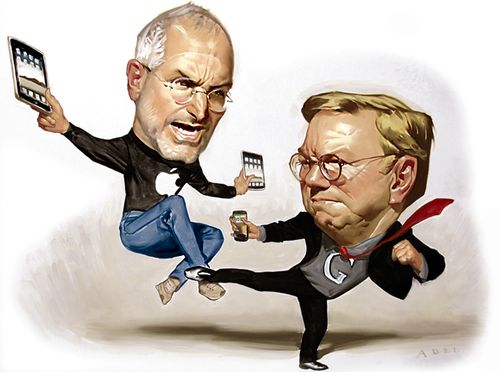 While we talk about the differences between the Mac and Windows OS, and between iOS and Android Platform, we can see both parties arguing on how the openness of the operating system affect its user experience. It is not hard to notice that Apple's controlled and closely integrated system works well, in terms of the quality of hardware, software, apps, and the ease of getting everything to integrate with each other, seamlessly, though it lacks the freedom of parts changing and modification, something considered important for hackers and hobbyists. Windows and Android, on the other side of the wall, offers the freedom to license their OS and software to various developers and companies, giving them better compatibility and ease of modification, but at the same time, struggle in the battle of piracy and quality control. To be fair, there are both pros and cons for both approaches.
While we talk about the differences between the Mac and Windows OS, and between iOS and Android Platform, we can see both parties arguing on how the openness of the operating system affect its user experience. It is not hard to notice that Apple's controlled and closely integrated system works well, in terms of the quality of hardware, software, apps, and the ease of getting everything to integrate with each other, seamlessly, though it lacks the freedom of parts changing and modification, something considered important for hackers and hobbyists. Windows and Android, on the other side of the wall, offers the freedom to license their OS and software to various developers and companies, giving them better compatibility and ease of modification, but at the same time, struggle in the battle of piracy and quality control. To be fair, there are both pros and cons for both approaches.  Talking about Android, it usually reminds us of its big boss, the king of search service, Google Inc. Like Microsoft, Google is working hard in expanding its empire, in both its web services as well as its mobile division, Android, which seems to be gobbling the mobile market share aggressively. While Android is growing healthier, same goes to its web counterpart, the Google web division. Google offers numerous services, ranging from media, blog, web browser to even social networking. Famous services like Gmail, Google News, Google Doc, Google Translate, Google Map, Chrome, and Google Earth have survived and develop through all these years, getting healthier and stronger. But the recently announced Google Plus social networking platform that aims to compete with Mark Zuckerberg's Facebook is somehow controversial. Many even question if Google is making the correct decision, whether this project's effort is in vain. "Do we need another Facebook?" is a common question that circulates around the web.
Talking about Android, it usually reminds us of its big boss, the king of search service, Google Inc. Like Microsoft, Google is working hard in expanding its empire, in both its web services as well as its mobile division, Android, which seems to be gobbling the mobile market share aggressively. While Android is growing healthier, same goes to its web counterpart, the Google web division. Google offers numerous services, ranging from media, blog, web browser to even social networking. Famous services like Gmail, Google News, Google Doc, Google Translate, Google Map, Chrome, and Google Earth have survived and develop through all these years, getting healthier and stronger. But the recently announced Google Plus social networking platform that aims to compete with Mark Zuckerberg's Facebook is somehow controversial. Many even question if Google is making the correct decision, whether this project's effort is in vain. "Do we need another Facebook?" is a common question that circulates around the web.Google Deserves the Credit
Though it's still too early to make assumption regarding to the future of this social network platform, which is practically in yet its infant stage, there's something Google did correctly that deserves the credit. Guess what, though many of us are penalizing Google for Android platform's lack of apps' quality control and its system's openness (leading to non-standard UI for different third party apps), Google did manage very well in designing its web apps and services. Evidence? Just look at the way Google make sure all its native web applications work and integrate together, seamlessly. Once you sign up a Google Account, you have instant access to everything, including your Gmail, Google News, Google Doc, Blogger and Google Plus, no extra sign up procedures required. It's not just that, with Google, every app is closely linked to each other. For instance, you can share your favourite blogpost or news through Google Plus by clicking on the "+1" button below the blog post. At the same time, you can also email news updates to your friends by clicking on the "Share via Email" icon. This works with Google Map as well, allowing you to share a map on your Google +, and at the same time, tag some friends from your circle, together with video and link sharing. Everything works smoothly together, making web browsing a pleasant experience.
Any Chance of Winning?
It is not certain whether Google Plus can overcome Facebook's current state of fame and glory, but its compelling features, less complicated and user-friendly interface, ease of access, add together with Google's existing strong foundation and worldwide supporters, make it an extremely competitive newbie with, what I believe, a bright future. So, let's wait and see.



very nice read
ReplyDeleteThanks for that :)
ReplyDelete